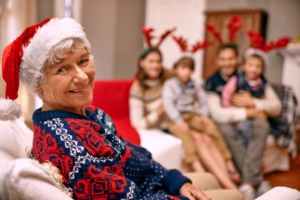Ft. Lauderdale Home Care Experts Share 5 Signs of Dementia to Watch During the Holidays

Learn the warning signs of dementia in this article by the Ft. Lauderdale home care experts.
As soon as the door swings open and your senior loved one wraps you in a warm hug, through the joyous holiday dinner and each timeless family custom, possibilities abound for not simply high quality time together, but also to assess how your parent is truly doing and if any red flags are detected.
In particular, there are specific indications which can signify cognitive concerns, such as Alzheimer’s disease. Because Alzheimer’s has become increasingly common in seniors, and because timely detection and intervention are fundamental, the dementia care team at Responsive Home Care’s Ft. Lauderdale home care office suggests checking for the following common early signs and symptoms of Alzheimer’s disease during your holiday visit this season:
- Social changes. As outlined by John Ramsay, CEO of Shift 8,“Dementia can cause people to become closed-off, avoiding any sense of social interaction.” Take note of any signs in both the senior’s conduct and conversations that point to his or her inclination for reclusiveness and isolation, especially if your senior loved one has consistently appreciated socializing.
- Mood shifts. Depression, anxiety, and apathy tend to be early components of dementia. The illness impacts a person’s capacity to process and manage emotions, often times caused by the inability to recall what sparked a bad feeling, leading to additional aggravation.
- Loss of memory. Problems with memory are at the heart of Alzheimer’s disease, specifically, short-term memory. Notice whether the senior seems to struggle with present-day occurrences, but is able to fully participate in discussions concerning the past.
- Problems with changed routines. Recognizing a sense of disorientation, anxiety or agitation is common throughout the holiday season, with its chances of disruptions to the usual routine. Seniors with dementia have a tendency to depend heavily on familiarity and may also appear out of sorts when deviating from the norm.
- Physical differences. Note any proof of a decrease in hygiene or in the cleanliness and organization of the house, particularly if your parent has until now been meticulous in keeping a sense of order.
Any worries such as these should really be brought to the attention of the senior’s primary care physician at the earliest opportunity.
And, it is helpful to have a dependable senior care partner readily available who understands the nuances of dementia along with other issues of aging, and will provide you with the specialized help which enables senior loved ones to stay safe and well. Contact Responsive Home Care’s Ft. Lauderdale caregivers online or at 954-486-6440 for more information on our highly skilled, professional dementia care services and for a free of charge in-home consultation to find out how we can help.
